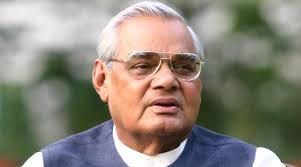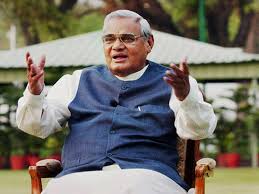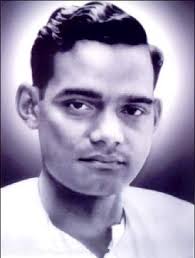Atal Bihari Vajpayee former Prime Minister of
India, poet, author, and politician died on 16 August 2018 at AIIMS hospital due to age
related illness
Vajpayee was referred to as the Bhishma Pitamah of Indian politics by former Prime Minister Manmohan Singh during a speech in the Rajya Sabha, a reference to a mythological figure in the Hindu epic Mahabharata who was held in respect by two warring sides.
 |
| Atal Bihari Vajpayee |
Vajpayee was referred to as the Bhishma Pitamah of Indian politics by former Prime Minister Manmohan Singh during a speech in the Rajya Sabha, a reference to a mythological figure in the Hindu epic Mahabharata who was held in respect by two warring sides.
Vajpayee was an Indian
politician who become three times as
the Prime Minister of India, first for a term of 13 days in 1996, for a period of
eleven months from 1998 to 1999, and then for a full term from 1999 to 2004. Vajpayee
was among the founding members of the erstwhile Bharatiya Jana
Sangh which he also headed from 1968 to 1972.
He was the Minister of External Affairs in
the cabinet of Prime Minister Morarji Desai.
When the Janata government collapsed,
Vajpayee restructured the Jana Sangh into the Bharatiya Janata
Party in 1980. He was the first Indian prime
minister not belonging to the Idian National Congress to serve a full five-year term.
He was conferred India's
highest civilian honour, the Bharat
Ratna, by the President of India in 2014. It was declared by the Modi government in
2014 that Vajpayee's birthday, 25 December, would be marked as Good
Governance Day.
·
Padma
Vibhushan (1992)
·
D. Lit. from Kanpur University (1993)
·
Lokmanya
Tilak Award (1994)
·
Outstanding
Parliamentarian Award (1994)
·
Bharat
Ratna Pandit Govind Vallabh Pant Award (1994)
·
Bharat
Ratna (2015)
·
Bangladesh
Liberation War honour (Bangladesh Muktijuddho Sanmanona) (2015)
Vajpayee was born to
Krishna Devi and Krishna Bihari Vajpayee on 25 December 1924 in Gwalior.
He completed his
post-graduation with an M.A. in Political Science from DAV College, Kanpur
He joined the Rashtriya Swayamsevak Sangh (RSS)
as a swayamsevak in 1939.
Influenced by Babasaheb Apte, he
attended the Officers Training Camp of the RSS during 1940–44 and became a
"full-time worker" in 1947, technically a prachara
Early Political Career (1942--1975)
In 1948, the RSS was banned for its alleged role in the assassination
of Mahatma Gandhi. In 1951, he was seconded by the RSS, along with Deendayal
Upadhyaya, to work for the newly formed Bharatiya Jana Sangh, a Hindu
right-wing political party associated with the RSS. He was appointed as a
national secretary of the party in charge of the Northern region, based in
Delhi. He soon became a follower and aide of party leader Syama Prasad
Mukherjee. In 1954, Vajpayee was with Mukherjee when he went on a fast-unto-death in Kashmir to
protest against perceived inferior treatment of non-Kashmiri Indian visitors to
the state. Mookerjee died in prison during this strike. In 1957, Vajpayee lost
to Raja Mahendra Pratap in Mathura for the Lok Sabha, the
lower house of Parliament of India, but was elected from Balrampur.
There, his oratorial skills so impressed Prime Minister Jawaharlal Nehru that
he predicted that Vajpayee would someday become India's Prime Minister.
By virtue of his oratorical and organizational skills, he became
the face of the Jana Sangh. After the death of Deendayal Upadhyaya, the
mantle of the leadership of Jana Sangh fell on the shoulders of a young
Vajpayee. He became the national president of the Jana Sangh in 1968 and, along
with Nanaji Deshmukh, Balraj Madhok and L. K. Advani, led
the Jana Sangh to national prominence.
Political Career (1975--1995)
Following Janata's victory
in the 1977 general elections, he became the Minister of External Affairs in Prime Minister Morarji Desai's cabinet. As
foreign minister, that year Vajpayee became the first person to deliver a
speech to the United Nations General Assembly in Hindi. By the time the Janata government
crumbled in 1979, Vajpayee had established himself as an experienced statesman
and a respected political leader.
Vajpayee joined many of
his Bharatiya Jana Sangh and Rashtriya Swayamsewak Sangh colleagues,
particularly his long-time friends L. K. Advani and Bhairon Singh Shekhawat, to form
the Bharatiya Janata Party (BJP)
in 1980. He became the BJP's first President. He emerged as a strong critic of
the Congress (R) government that
followed the Janata government.
The BJP became the political voice of the Ram Janmabhoomi
Mandir Movement, which was led by activists of the Vishva Hindu Parishad (VHP)
and the RSS, and which sought to build a temple dedicated to Lord Rama in Ayodhya.
Victory in the assembly elections in Gujarat and Maharashtra in
March 1995, and a good performance in the elections to the Karnataka assembly
in December 1994, propelled the BJP to greater political prominence. During a
BJP conference in Mumbai in November 1995, BJP President L. K. Advani declared
that Vajpayee would become the Prime Minister of India. The BJP won in the
May 1996 parliamentary elections.
As Prime minister of India
Vajpayee served as the Prime Minister
of India between 1996 and 2004 in three non-consecutive terms.
First term: May 1996
In
the 1996 general elections, the BJP
emerged as the single largest party in the Lok Sabha. The then president Shankar
Dayal Sharma invited Vajpayee to form the
government. Vajpayee was sworn in as the 10th Prime Minister of India, but the
BJP failed to muster enough support from other parties to obtain a majority. He
resigned after 13 days, when it became clear that he could not garner a
majority.
Second term: 1998–1999
Nuclear tests
In May 1998, India
conducted five underground nuclear tests in Pokhran desert in Rajasthan, 24 yrs after India conducted its first nuclear test (Smiling
Buddha) in 1974. This test is called Pokhran-II. The tests were held just a month after the government
had been in power. Two weeks later, Pakistan responded with its own nuclear
tests making it the newest declared nation with nuclear weapons.
The Lahore summit
In 1999, Vajpayee began a push for a
full-scale diplomatic peace process with Pakistan. With the historic
inauguration of the Delhi-Lahore bus service in February 1999, Vajpayee
initiated a new peace process aimed towards permanently resolving the Kashmir
dispute and other conflicts with Pakistan.
Kargil
Victory
The
victory in Kargil bolstered the image of Vajpayee and he was hailed across the
country for his bold and strong leadership. On 26 July 2012, designated as
'Kargil Vijay Diwas', BJP President Nitin Gadkari unveiled a wax statue of Atal Bihari Vajpayee in
Mumbai. The statue is to be put up at a wax museum in Lonavala.
Third term: 1999–2004
Indian Airlines hijack
A national crisis emerged in December 1999,
when Indian Airlines flight IC 814 from Kathmandu to New
Delhi was hijacked by five terrorists and flown to Taliban-ruled Afghanistan.] The hijackers made several demands including
the release of certain terrorists like Masood Azhar from prison.
Under extreme pressure, the government ultimately caved in. Jaswant Singh,
the Minister for External Affairs at the time, flew with the terrorists to
Afghanistan and exchanged them for the passengers.
National highway project, foreign policy and economic reforms
Vajpayee's pet projects were the National
Highways Development Project and Pradhan
Mantri Gram Sadak Yojana.
Vajpayee again initiated Indo-Pak relations by
inviting Pakistani President Pervez Musharraf to Delhi and Agra for
a joint summit and peace talks. His second major attempt to move beyond
the stalemate involved inviting the man who had planned the Kargil invasions.
But accepting him as the President of Pakistan, Vajpayee chose to move forward.
But after three days of much fanfare, which included Musharraf visiting his
birthplace in Delhi, the summit failed to achieve a breakthrough as President
Musharraf declined to leave aside the issue of Kashmir.
In 2001, the Vajpayee government launched the
famous Sarva Shiksha Abhiyan, which aimed at improving the quality of
education in primary and secondary schools.
Vajpayee’s
Personal Life
Vajpayee remained unmarried. He adopted Namita Bhattacharya, the
daughter of BN Kaul and Rajkumari Kaul
He was fond of Indian music and dance. He loved nature and one
of his favourite retreats was Manali in Himachal Pradesh.
He was a published poet, and with regard to his poetry he wrote,
"My poetry is a declaration of war, not an exordium to defeat. It is not
the defeated soldier's drumbeat of despair, but the fighting warrior's will to
win. It is not the despirited voice of dejection but the stirring shout of
victory
Notable work of Vajpayee
Social and political
·
National
Integration (1961)
·
Dynamics
of an Open Society (1977)
·
New
Dimensions of India's Foreign Policy (1979)
·
Heal
the Wounds: Vajpayee's appeal on Assam tragedy to the Parliament (1983)
·
Kucha
Lekha, Kucha Bhashana (1996)
·
Sekyularavada:
Bharatiya Parikalpana (Da. Rajendra Prasada Smaraka Vyakhyanamala) (1996)
·
Bindu-Bindu
Vicara (1997)
·
Rajaniti
ki Rapatili Rahem (1997)
·
Back
to Square One (1998)
·
Decisive
Days (1999)
·
Sakti
Se Santi (1999)
·
Vicara-Bindu (Hindi Edition, 2000)
·
Nayi
Chunauti, Naya Avasara (Hindi
Edition, 2002)
·
India's
Perspectives on ASEAN and the Asia-Pacific Region (2003)
Books written by Vajpayee
·
India's
Foreign Policy: New Dimensions (1977)
·
Assam
Problem: Repression no Solution (1981)
·
Atal
Bihari Vaj Mem Tina Dasaka (1992)
·
Pradhan
Mantri Atal Bihari Vajpayee Ke Chune Hue Bhashana (2000)
·
Values,
Vision & Verses of Vajpayee: India's Man of Destiny (2001)
·
National
Integration (1961)
·
Dynamics
of an Open Society (1977)
·
Kucha
Lekha, Kucha Bhashana (1996)
·
Sekyularavada:
Bharatiya Parikalpana (Da. Rajendra Prasada Smaraka Vyakhyanamala) (1996)
·
Rajaniti
ki Rapatili Rahem (1997)
·
Back
to Square One (1998)
·
Decisive
Days (1999)
·
Sakti
Se Santi (1999)
·
India's
Perspectives on ASEAN and the Asia-Pacific Region (2003)
Poetry composed by Vajpayee
·
Meri
Ikyavana Kavitaem (1995)
·
Meri
Ikyavana Kavitaem (Hindi Edition, 1995)
·
Sreshtha
Kabita (1997)
·
Nayi
Disha – An Album with Jagjit Singh (1995)
·
Kya
Khoya Kya Paya: Atal Bihari Vajapeyi, Vyaktitva Aur Kavitaem (Hindi Edition, 1999)
·
Samvedna
– An Album with Jagjit Singh (1995)
·
Twenty-One
Poems (2003)
Speeches delivered by Vajpayee
·
Prime
Minister Atal Bihari Vajpayee, selected speeches. (2000)
·
President's
addresses, 1980–1986. (2000).
·
Presidential
address. (1986).
·
Presidential
address: Bharatiya Pratinidhi Sabha session, Bhagalpur (Bihar), 5 6 & 7 May
1972. (1972).
·
Atal
Bihari Vajpayee and Pokhran



Very nice sir
ReplyDeleteThank you sir
DeleteExcellent
ReplyDeleteThank you sir
Delete